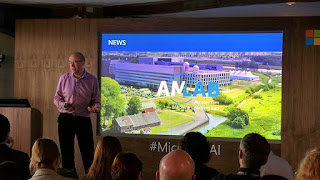So, look at my musings on the event here: (if the video doesn’t show up, check here)
No time to watch – here is the 1-2 slide condensation (if the slide doesn’t show up, check here):
Here you go: Always tough to pick the takeaways – but here are my Top 3:
Beyond the direct product impact, Microsoft announced “AI for Earth” bringing the heft of R&D and deep pockets of Microsoft to the challenging environmental questions that the world sees – and where AI certainly can help.
 |
| Packed Event |
 |
| Chris Bishop announced AMLab partnership |
Democratization of AI and Ethics – Always good to see the commitment to bring AI to more people and use cases, one of the leitmotivs of any Nadella presentation these days. The event was certainly in line with this and presented many examples for it – all starting with AI for Earth. And good to see that Microsoft has created an ethical design guide for all its employees working on AI. An important subject and mechanism amongst the ‘grown up’ AI vendors.
 |
| Great London Views |
MyPOV
A notable event to attend, showing Microsoft’s across the board commitment and push to AI. AI everywhere is pretty much at play at Microsoft and is showing first and promising results. Having the event in London showed the R&D investment that Microsoft is doing beyond Redmond / the US and the UK certainly has a substantial contribution to AI in general and a significant Microsoft presence. But it is early days, e.g. one of the mechanisms that have always worked for Microsoft - connecting it all into a suite of consistent and user centric offerings has not happened yet. E.g. translating a slide with a picture of a person in PowerPoint, mentioning the name of the person - will not (yet) make it a recognized person in the “Seeing AI” app. And there are of course the downsides from a data privacy perspective – but Microsoft must realize that its competitors in the space are ruthless at leveraging those synergies. It is likely Microsoft needs (and will) do the same.On the concern side, Microsoft has to find a match to the uptake in mindshare and real-world AI deployments that Google’s Tensorflow is seeing, if not Tensorflow will be the Kubernetes of 2017 – a Google launched open source offering that dominates an important aspect of the cloud infrastructure. And one can argue that Tensorflow is even bigger stakes than Kubernetes, as it not only dominates the AI / Machine Learning equation, but due to data gravity pulls along substantial data storage and processing load. Not to mention the model training and execution loads.
But for now, it is good to see the progress at Microsoft, who is pushing AI wide and deep across its existing products, as well as new offerings. A deep R&D and research check book certainly helps, but must show tangible, shorter horizon returns to capture what matters most in AI these days – cloud load – both from a storage and compute perspective. Stay tuned.
Want to learn more? Checkout the Storify collection below (if it doesn’t show up – check here).


